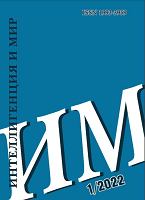Российско-Израильские отношения в 2000—2021 гг.: сотрудничество в области культуры, науки и образования
Russian-Israili Relations in 2000—2021: Cooperation in the Field of Culture, Science and Education
Author(s): Anastasia P. Anisimova, Sergey V. TochenovSubject(s): Education, Governance, Diplomatic history, Recent History (1900 till today), Politics and society, Culture and social structure , Tourism
Published by: Ивановский государственный университет
Keywords: Russian Federation; State of Israel; cultural and humanitarian cooperation; cultural ties; cultural exchange; science; education; tourism; pilgrimage;
Summary/Abstract: The article briefly presents an analysis of the relationship between Russia and Israel in the field of culture, science and education from the beginning of the XXI century to the present stage. The relevance of this work is due to the fact that the studied aspects are insufficiently covered in scientific works and are most often mentioned in the framework of a general study of Russian-Israeli relations, but not as a separate topic. In addition, solving the problems of intercultural interaction is of great importance, since it is a fundamental element of intergovernmental relations. And it is important that cultural and humanitarian ties form the country’s “image” abroad. Therefore, building a competent cultural policy (including as an instrument of “soft power”) will always be a significant area of state’s activity. The purpose of this study is to analyze the development of the cultural and humanitarian sphere of Russian-Israeli cooperation in 2000—2021. The methodological basis of the research within the framework of the systems approach is based on the principles of historicism, causality and objectivity. The theoretical basis for the analysis of relations between Russia and Israel is based on the ideas of neorealism (as interpreted by Kenneth Waltz). General scientific research methods include analysis, synthesis, induction, deduction. The main methods of political science research include content analysis, the method of expert assessments, and the method of quantitative analysis of statistical data. The conducted research allows us to draw the following conclusions. In general, Russian-Israeli cooperation in the cultural sphere can be characterized as effective, since one can see the dynamics of expanding contacts and strengthening ties at all levels and in all the areas considered. Starting with the normative and legal consolidation of relations, the states moved into an active stage of implementation of the signed agreements in the second decade of the XXI century. By now, development trajectories are being adjusted based on modern challenges. We can talk about finding relations at their highest point for the entire study period, despite the presence of external and internal political problems and disagreements.
Journal: Интеллигенция и мир
- Issue Year: 2022
- Issue No: 1
- Page Range: 45-72
- Page Count: 28
- Language: Russian

